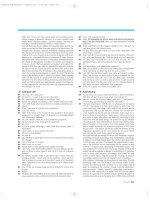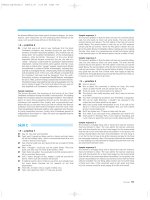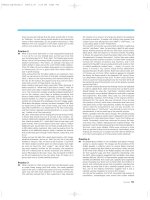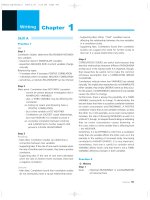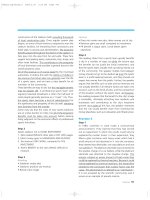Tài liệu Mastering skills for the toefl ibt part 9 doc
Bạn đang xem bản rút gọn của tài liệu. Xem và tải ngay bản đầy đủ của tài liệu tại đây (452.31 KB, 10 trang )
Answer Key
773
Step 2
Suggested keywords:
British Imperialism, foreigners from the north,
archaeologists, destroyed and plundered, racist myth
Sample restatement:
British officials felt threatened by the idea of a civilization
founded by Black Africans. It undermined their justifications
for imperialism. They hired archaeologists who destroyed
and plundered the ruins and then concluded that foreigners
from the north had founded the civilization. After another
archaeologist contradicted the official theory, the site
was closed off. Eventually, people recognized the reality
behind the racist myth.
Step 3
--- First British investigation: archaeologists destroyed
and plundered site
--- Conclusion and result: foreigners from the north
built the ruins
--- Further investigation: archaeologists studied site
again in 1905
--- Conclusion and result: contradicted earlier findings,
archaeologists banned from site
--- Accepted idea today: ruins built by local Shona-speakers
Skill C
Q5 --- practice 1
Step 1
Suggested answers:
Problem: The woman needs to get some books but
does not have her university library card.
Solution 1: Use the public library
Solution 2: Try to borrow someone else’s card
Step 2
Problem: She needs to get some books but does not
have her university library card.
Best solution: Use the public library
Reason 1: This is the quickest solution.
Reason 2: The other solution will impose on someone.
Problem: She needs to get some books but does not
have her university library card.
Best solution: Try to borrow someone else’s card
Reason 1: She will probably find someone to help her.
Reason 2: The public library may not have adequate
resources.
Q5 --- practice 2
Step 1
Suggested answers:
Problem: The woman’s roommate is untidy, and she
eats her food.
Solution 1: Talk to her about it.
Solution 2: Say nothing and wait until the school year
is over. Then, she won’t have to live with
her anymore.
Step 2
Problem: The woman’s roommate is untidy, and she
eats her food.
Best solution: Talk to the roommate and ask her to be
more considerate.
Reason 1: She will be happier if they resolve the
problem.
Reason 2: The woman will save money on food.
Problem: The woman’s roommate is untidy, and she
eats her food.
Best solution: Tolerate the roommate’s behavior for two
more months.
Reason 1: Don’t risk having her roommate move out.
Reason 2: Keep her roommate as a friend.
Q5 --- practice 3
Step 1
Problem: The man doesn’t want to dissect a pig in
biology class.
Solution 1: Refuse to take part
Solution 2: Dissect the pig
Step 2
Problem: The man doesn’t want to dissect a pig in
biology class.
Mastering-Books_5 2006.5.29 2:13 PM Page 773
774
Answer Key
Best Solution: Refuse to take part
Reason 1: Won’t have to do something that he is
morally opposed to
Reason 2: May bring about change in the school’s
practice
Problem: The man doesn’t want to dissect a pig in
biology class.
Best Solution: Dissect the pig
Reason 1: Stay on the teacher’s good side
Reason 2: Won’t risk getting a bad grade
Q6 --- practice 1
Step 1
Falconry is: a way to hunt prey using a trained falcon
Falconers must:
a) tame the falcon
b) train the falcon not to kill the prey
Today falconry is: a sport
Historically, falconry was: a means of survival
Nomadic people in the desert: used falconry to add
variety to their diets
Falconry dates back to: China in 2000 B.C.
Q6 --- practice 2
Step 1
An aura is a symptom or set of symptoms that precede
a migraine.
example: perception of flashing lights
Common characteristics of migraines:
--- bad headache
--- vomiting
--- bothered by noise
--- bothered by light
Process of migraine: Arteries bringing blood to the brain
constrict ➝ Less oxygen getting to the brain ➝ Arteries
in brain expand causing pain
Possible way to prevent migraines from occurring: Identify
the triggers that cause the arteries to constrict and avoid
them.
Q6 --- practice 3
Step 1
Standard view of evolution: Species arise gradually over
time due to natural selection.
Example: Horses used to be the size of small cats.
Counter-evidence: Source: Fossil record
Trend: Species remain unchanged for long periods of
time.
New species arise quickly.
New theory: Punctuated Equilibrium
--- Large populations typically dilute advantageous
mutations.
--- Speciation occurs in peripheral subpopulations
because they are smaller and are located in novel
ecosystems.
--- After the change, the new species might compete
with and exterminate the old species.
The new theory is not in conflict with the standard view.
Vocabulary Review
Review 1
1. (C) 2. (A) 3. (D)
4. (D) 5. (B) 6. (A)
7. (B) 8. (D) 9. (B)
10. (A) 11. (D) 12. (A)
13. (B) 14. (D) 15. (D)
16. gadget 17. dyslexia 18. diverting
19. perseverance 20. better off 21. (C)
22. (A) 23. (E) 24. (D)
25. (B)
Review 2
1. (B) 2. (D) 3. (A)
4. (C) 5. (A) 6. (D)
7. (C) 8. (A) 9. (A)
10. (D) 11. (B) 12. (C)
13. (B) 14. (A) 15. (D)
16. asserts 17. imperceptible 18. dilute
19. peripheral 20. exterminate 21. pandemic
22. thrive 23. enlist
24. complement 25. surrender
Mastering-Books_5 2006.5.29 2:13 PM Page 774
Answer Key
775
Skill A
Q1 --- practice 1
Step 1
Transitions: by now, every week, last year, later, of
course, as it turned out
Sentence Order: C, F, D, B, A, E
Step 2
Suggested answers:
1. They met on an Internet site for students studying
languages.
2. They practice Chinese and English together.
3. It helped him appreciate Chinese culture and
broadened his view of the world.
Step 3
Sample response:
Last year, I met a fellow language student on an Internet
study forum when I was trying to practice for a Chinese
class. As it turned out, he was a Chinese student trying
to practice English. Later, we developed a symbiotic
relationship by helping each other practice our respective
languages. Every week, we chat for 30 minutes in English
and 30 minutes in Chinese. By now, we have become
good friends, and we have both learned a lot. Of course,
among the things I’ve learned is the fact that Chinese
culture is fascinating, and this experience has really
broadened my view of the world.
Q1 --- practice 2
Step 1
Transitions: after, however, for example, instead, before
that, in fact
Sentence Order: C, F, A, D, G, B, E
Step 2
Suggested answers:
1. The speaker was studying at university when the
Internet became commonly used.
2. The Internet allowed the speaker to do research
from her dorm room.
3. The Internet allowed the speaker to communicate
with her parents for free.
Step 3
Sample response:
One technological innovation I witnessed during my
university days was the spread of the Internet. Before
that, I spent hours in the library doing research. After
the Internet came into widespread use, however, I didn’t
have to go to the library at all. I could do all of my research
from a computer in my dorm room, which saved a lot
of time. In fact, the Internet saved me a great deal of
money, too! For example, I no longer had to make
expensive, obligatory phone calls to my parents. Instead,
I could send them updates via email for free.
Q1 --- practice 3
Step 2
Sample response:
My life was changed by an unexpected blizzard. One
day when I left my house to go to the airport, the weather
was cool but clear. As I was driving to the airport, though,
it started snowing. Within minutes, there was a raging
blizzard. I knew my flight to Jamaica was going to be
canceled, so I was terribly disappointed. Then, I noticed
a stranded motorist, so I pulled over to help. I offered
the man a lift so he could call a tow truck. Three years
later, I married that man. If it weren’t for that blizzard,
we wouldn’t have met.
Q1 --- practice 4
Step 2
Sample response:
The Optimists’ Club is an organization that has been very
important in my life. They organize fun and enriching
activities for kids in the city. For example, I had a great
experience and forged lasting friendships while
participating in their youth basketball league. In addition,
they provide counselors who help troubled youths with
problems. One time, I was on edge about my high school
course work, and I did not have anyone to turn to for
guidance. The Optimists’ Club counselor provided me
with some very useful advice I needed in order to select
the appropriate classes to enroll in.
Chapter
2
Mastering-Books_5 2006.5.29 2:13 PM Page 775
Q2 --- practice 1
Step 1
Transitions: thus, conversely, for instance, first, second,
indeed
Sentence Order: D, E, F, C, G, B, A
Step 2
Suggested answers:
1. The speaker’s view is that childhood is the most
important time of a person’s life.
2. One reason is that childhood is when basic personality
develops.
3. Another reason is that experiences in childhood
affect the rest of a person’s life.
Step 3
Sample response:
I believe that childhood is a critical period in a person’s
life. First, it is the time in which personality is developed.
Second, a person’s experiences in childhood affect the
remainder of his or her life. For instance, a major trauma
experienced at the age of six has a much more devastating
effect than one experienced at age thirty. Indeed,
negative or traumatic experiences in childhood can lead to
psychological problems in adulthood, such as depression
and antisocial behavior. Conversely, positive, nurturing
experiences in childhood foster mental health and
well-being in adulthood. Thus, it is crucial to have positive
influences in childhood.
Q2 --- practice 2
Step 1
Transitions: on the other hand, that’s why, however,
unfortunately
Sentence Order: D, F, B, A, E, G, C
Step 2
Suggested answers:
1. The speaker thinks parents can teach their kids
academic skills, like reading, writing, and math.
2. The speaker thinks that parents cannot adequately
teach their children social skills.
3. The speaker thinks children should be educated in
a social setting, i.e. in schools.
Step 3
Sample response:
Most parents are capable of teaching their children to
read, write, add, and subtract, as well as many of the
other basic skills children are taught at school. However,
there are some skills that cannot be taught sufficiently
at home. The skills I am referring to are social skills. These,
I believe, are the most important skills learned at school.
That’s why I am of the opinion that children should learn
in a social environment. Unfortunately, the home cannot
provide an adequate social milieu for children to learn to
live with a diverse group of people. Public schools, on the
other hand, can and do provide this setting.
Q2 --- practice 3
Step 2
Sample response:
I believe zoos serve a multitude of useful purposes. For
one thing, zoos educate visitors. If there were no zoos,
children would grow up never witnessing species not
indigenous to their area. With zoos, in contrast, children
can learn about all kinds of different animal species and
observe them up close. That’s more captivating and
educational than looking at pictures or reading texts.
For that matter, zoos provide an entertainment venue
for people of all ages. Additionally, they provide a safe
home for animals whose survival is threatened in the
wild. Animals that are endangered can be kept safe and
well fed, as well as be encouraged to breed.
Q2 --- practice 4
Step 2
Sample response:
In some countries, all citizens are required to vote, while
in others, individuals are free to decide whether to vote
or not. I prefer the system in which voting is optional. First,
in this system, public interest is more important because
it affects voter turnout. Therefore, governments and
candidates for office must work harder to sway the
opinions of voters. Second, people should be free to
protest an election by refraining from taking part. Indeed,
the very idea of forcing constituents to vote runs counter
to the principles upon which free society is based.
776
Answer Key
Mastering-Books_5 2006.5.29 2:13 PM Page 776
Answer Key
777
Skill B
Q3 --- practice 1
Step 1
Suggested answers:
The problem: woman can’t use scholarship to study
abroad
Man’s opinion of policy: arbitrary and unfair
--- Reason 1: woman earned her scholarship (not
athletic or need-based)
--- Reason 2: woman qualified for need-based, but
chose academic scholarship instead
Step 3
Sample response:
The man’s opinion is that the school’s policy of only
allowing students with need-based scholarships to use
that money toward the Study Abroad Program is unfair.
To begin, he contends that the woman earned her
scholarship through academic merit rather than athletic
skill or financial need. Secondly, the woman did qualify
for a need-based scholarship but opted for the academic
one, showing that she has the same financial need as
students with need-based scholarships. For these two
reasons, he feels the woman should be allowed to use
her grant money to pay for tuition abroad.
Q3 --- practice 2
Step 1
Suggested answers:
Woman’s opinion:
--- lottery system is unfair
Why:
--- gives preferential treatment but should be
based on need
--- will cost her a lot of money for rent and
transportation
--- she won’t be able to study late at the library
What university should have done:
--- done construction in summer or made
arrangements for students
Step 3
Sample response:
The woman is angry about the announced plan for a
housing lottery for graduate students. First, she thinks it
is unfair because students of certain majors are being
given priority. Instead, she believes the housing should be
assigned based on need. Second, she is upset because
living off campus will be expensive and inconvenient.
For example, she will pay more in rent and transportation
and will not be able to study late on campus. In the end,
she complains that they should have done the renovations
during the summer or otherwise accommodated the
needs of all students.
Q4 --- practice 1
Step 1
Suggested answers:
Morphology of giant squid:
--- length: 10-15 meters
--- appendages: 8 arms, 2 tentacles
--- suckers: have sharp, claw-like components
Theories on feeding behavior:
--- passive reason: large body requires too much
energy to move quickly
--- active reasons: i) tentacles have claw-like parts
suggesting capture of prey
ii) smaller squid species are active
feeders
Step 3
Sample response:
The reading passage describes the morphological
differences between marine animals that are active
feeders and passive feeders. The lecturer examines the
morphology of the giant squid and different theories
about its feeding habits. First, the giant squid is a very
large creature. Second, it has two tentacles that include
sharp, claw-like components. Some scientists have
postulated that the enormous size of the giant squid
suggests it must be a passive feeder. Other scientists,
in contrast, point to its tentacles and the model of
smaller squid species as evidence suggesting that the
giant squid is an active feeder.
Mastering-Books_5 2006.5.29 2:13 PM Page 777



